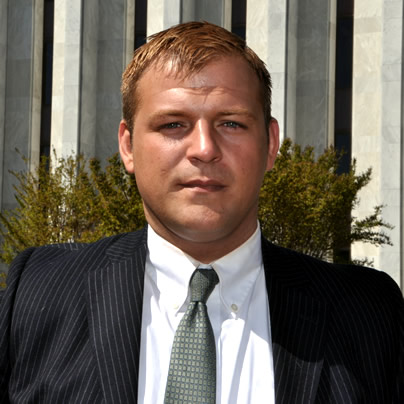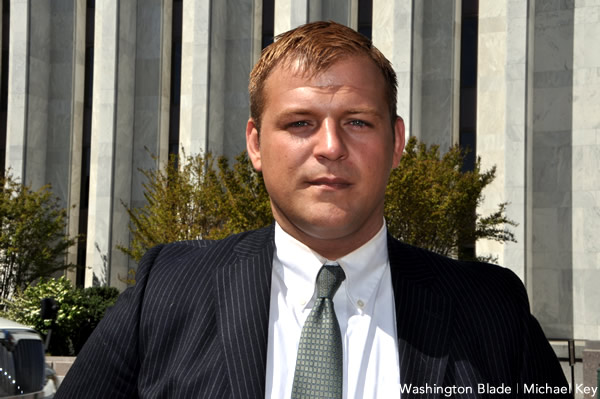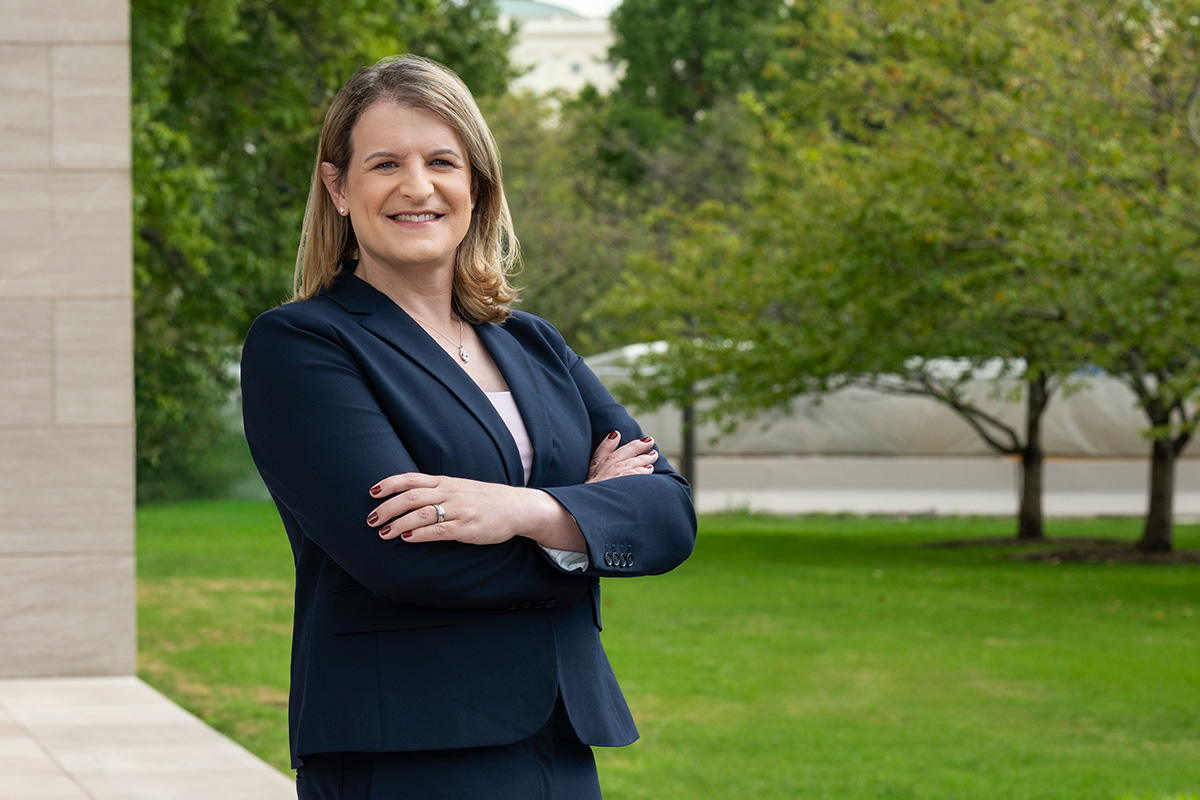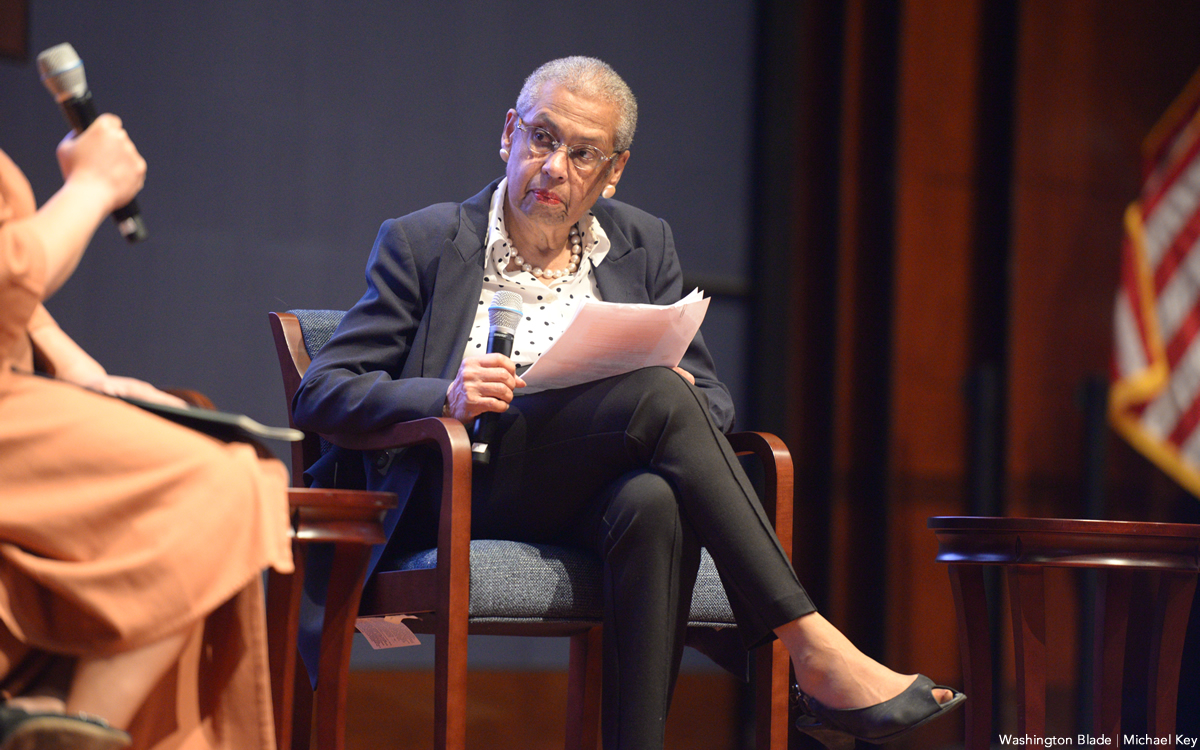Local
Library of Congress staffer fired, claims anti-gay bias
Says he was outed on Facebook, ‘stalked’ by superior at D.C. gay bar


Peter TerVeer, 30, was fired last week from his job at the Library of Congress and claims his former boss cited biblical passages condemning homosexuality.
A gay man has charged in a discrimination complaint that he was fired last week from his job at the Library of Congress after being harassed and humiliated for more than a year by a supervisor who repeatedly cited passages from the Bible condemning homosexuality.
Peter TerVeer, 30, a management analyst at the Library of Congress’s Office of the Inspector General since 2008, says in his complaint that supervisor John R. Mech created a hostile work environment for him to such a degree that he suffered severe stress, forcing him to take disability leave last fall and earlier this year.
“I contend that I have been subjected to a hostile work environment by Mr. Mech since August 2009 on the basis of my sex (male), sexual orientation (homosexual), and religion (non-denominational Christian/Agnostic),” TerVeer states in an affidavit accompanying his complaint.
“I maintain that Mr. Mech has acted to impose his religious beliefs on me,” TerVeer says in the affidavit.
TerVeer’s attorney, Thomas Simeone, said he will likely file a discrimination related lawsuit against the library on TerVeer’s behalf regardless of how the federal Equal Employment Opportunity Commission (EEOC), which is deliberating over the complaint, rules on the matter.
Gayle Osterberg, director of communications for the Library of Congress, said TerVeer’s complaint is considered a personnel matter and the library never comments on personnel-related issues pertaining to an individual employee.
She said that under library rules, neither John Mech, an accountant and lead auditor for the library’s Office of The Inspector General, nor any other library employee familiar with TerVeer’s case would be permitted to comment on the case.
Simeone said a key factor in the case is that library officials promoted TerVeer three times and praised his work and that negative job performance reviews suddenly began after Mech learned TerVeer was gay.
Asked about a policy adopted by the Library of Congress in the 1990s prohibiting employment discrimination based on sexual orientation, Osterberg declined to confirm whether such a policy is still in effect.
“We adhere to Title 7, period,” she said, referring to a provision in existing U.S. civil rights law that bans job discrimination based on race, religion, national origin, sex and other criteria but not on sexual orientation.
An internal “Librarian’s Policy Statement Regarding Non-Discrimination” issued to Library of Congress Employees on May 6, 2010, reiterates the 1990s-era statement pertaining to sexual orientation discrimination.
“Discrimination on the basis of race, color, religion, sex (including sexual harassment), national origin, age, disability, sexual orientation, gender identity, and/or political affiliation will not be tolerated,” the statement says.
Osterberg declined to disclose whether that and previous sexual orientation non-discrimination statements were still in effect.
TerVeer’s complaint, filed with the EEOC, follows a September 2008 federal court decision finding that the Library of Congress violated federal law against sex discrimination by denying a job to a transgender woman.
In that case, the library had determined that the applicant was qualified and hired her shortly before she announced she was transitioning from male to female. When officials learned that David Schroer was transitioning to Diane Schroer they rescinded the job offer and refused to hire Schroer.
A U.S. District Court judge ruled in September 2008 that the library’s refusal to hire Schroer violated a federal law prohibiting sex discrimination, a development hailed by the ACLU as an important breakthrough for transgender rights. The library decided against appealing the case and agreed to an out-of-court settlement with Diane Schroer in which it paid her compensatory damages.
Library of Congress: ‘AWOL’ for 37 days?
In a March 29, 2012 letter to TerVeer, Karl W. Schornagel, the library’s Inspector General and head of the division where TerVeer worked, said he approved TerVeer’s firing on grounds that TerVeer had been absent from work without approved leave or “AWOL” since Jan. 4, 2012.
Schornagel states in the letter that under library personnel rules, absence without approved leave is considered a form of misconduct that could lead to disciplinary action, including dismissal.
“I considered that you failed to report for duty as scheduled for over 37 consecutive workdays and failed to properly request approved leave despite being reminded of the proper procedures for requesting approved leave and advised of the consequences of your failure to report for duty as scheduled,” Schornagel said in his letter.
TerVeer told the Blade that library officials approved disability leave he had requested in October 2011 at the urging of his therapist and doctor based on the therapist’s determination that a hostile work environment at the library caused him to suffer severe mental stress.
According to TerVeer, the unpaid disability leave approved by the library expired in January 2012. He said library officials declined his request for a transfer to another office and demanded he return to duty with Mech remaining as his supervisor.
Simeone, TerVeer’s attorney, said library rules may have allowed TerVeer to apply for an extended disability leave. But he said TerVeer by that time had exhausted his financial resources following three months of unpaid leave and couldn’t afford to pay doctors and his therapist for the necessary examination and documentation needed to apply for extended disability leave.
“He was in a bind,” said Simeone. “He loved working there and he wanted to continue. And as you can tell, he needed the money. He tried to get a transfer to a new setting or a new area, but it was just not possible. They wouldn’t do that.”
Simeone said going back to the office where TerVeer knew he would be subjected to the same harassment and stress wasn’t an option he could accept.
Outed by boss’s daughter
TerVeer told the Blade he never intended to come out as gay at work when he first started his job at the library in February 2008. He said he had recently moved to D.C. from rural Western Michigan, which he said was devastated by the economic recession.
With a bachelor’s degree in business management from Hope College in Michigan and his enrollment at the University of Maryland for a degree in accounting and auditing, TerVeer said the start of his employment at the library’s Office of The Inspector General appeared to be a perfect fit for his chosen career path.
“The first year and a half, almost two years I was there I was closeted and essentially I was kind of the golden boy in the office,” he said. “He took me under his wing and we had a cordial discourse,” he said of Mech. “And he appeared to come off initially as really nice.”
TerVeer said the cordial relationship was based, in part, on their shared interest in sports and TerVeer’s role as captain of a school football team in Michigan. At one point Mech invited him to join his wife and son at a University of Maryland football game, TerVeer said.
As TerVeer tells it, his problems started just after that, when Mech invited him to “look up his daughter” in the late summer or early fall of 2009. Within days, said TerVeer, Mech’s daughter Katie contacted him on Facebook and asked to become Facebook friends.
He said he accepted her request after using the appropriate Facebook privacy controls to hide information on his own Facebook page that identified him as gay. But a short time later, Facebook put in place changes in its settings in such a way that TerVeer’s link to a Facebook group in support of gay adoptions became publicly visible, TerVeer said.
“I get home one day and she saw it and commented and she said, ‘You’re not one of those weirdoes are you?’ I said I am actually, in fact, one of those weird ones if you’re referring to the fact that I’m gay.”
TerVeer said Katie Mech initially said she wasn’t troubled by this discovery, saying she had a good friend in San Francisco who’s gay.
However, the following day TerVeer said he discovered that she had both “de-friended” and blocked him from her Facebook page. Within days of that, John Mech began raising his religious beliefs with TerVeer in emails and in face-to-face conversations with him, TerVeer said.
“All of a sudden now, every time I’m going into his office he’s starting off with a religious conversation. Then it comes out where he pointed out he was a believer with a literal translation of the Bible,” said TerVeer. “Then he goes specifically into homosexuality.”
TerVeer said he knew then that Katie Mech informed her father that he is gay.
In his affidavit, TerVeer said things came to a head on June 21, 2010.
“He came into my office on that date and said he wanted to educate me on hell and that it was a sin to be a homosexual,” TerVeer says in the affidavit. “He said he hoped I repented because the Bible was very clear about what God does to homosexuals.”
Among other things, TerVeer says in the affidavit that Mech quoted the Old Testament passage of Leviticus, stating, “If a man lies with a man as one lies with a woman, both of them have done what is detestable. They must be put to death; their blood will be on their heads.”
TerVeer says in the affidavit, “He stated that as a homosexual I could never succeed because it was against God’s law.”
Four days later, on June 25, 2010, Mech spoke with TerVeer about TerVeer’s annual performance review and TerVeer expressed concern that his ratings were lower than he believed they should be, he says in the affidavit.
According to the affidavit, he politely told Mech he was concerned that the lower performance review might be biased because of Mech’s strongly expressed religious beliefs toward homosexuality.
“Mr. Mech became extremely upset and vehemently denied that my homosexuality and his personal views had an impact on his rating of me,” TerVeer says in the affidavit. “He accused me of attempting to injure his career and reputation and to ‘bring down the Library.’”
Gay official ‘stalks’ TerVeer
TerVeer says in his affidavit that beginning in July 2010 through the middle of 2011 Mech appeared to be “piling on” work assignments in an effort to set him up to fail. He said one particular project he was assigned to handle by himself had been previously worked on by six full-time employees and took more than a year to complete, yet he was told to complete it during a shorter period of time.
“I believe that Mr. Mech gave me this assignment to set me up for failure and to give him a better opportunity to identify and manufacture deficiencies in my performance,” TerVeer says in the affidavit. “I believe he decided in advance to give me negative ratings in my next performance review and began to create a record of alleged ‘job deficiencies’ to support this.”
In an effort to appeal what he believed to be an unfairly negative job performance rating calling for denying him a normally routine “step” pay increase, TerVeer said he approached Mech’s supervisor, Nicholas Christopher, the assistant inspector general for audits. “Mr. Christopher declined to change my performance evaluation and denied me a WIGI [Within Grade Increase]” in pay, he says in the affidavit.
When he indicated he was in the process of filing a possible discrimination complaint, TerVeer said that both Mech and Christopher appeared to warn him against doing so, saying he could face consequences such as additional poor performance ratings.
In a staff meeting on June 28, 2011, TerVeer says in the affidavit that Mech demanded that he explain, “what I was doing” concerning his stated intention to appeal the low job performance rating.
“He berated and humiliated me in front of my co-workers,” TerVeer says in the affidavit. “He interrogated me regarding the exact nature of my appeal and who I was filing the action against.”
After beginning his disability leave in the fall of 2011, TerVeer said he was startled when Christopher appeared at the D.C. gay bar Number Nine, where TerVeer had been working as a security staffer, and began to take a video of him with his cell phone.
TerVeer and his lawyer at the time, Brennan McCarthy, said TerVeer’s therapist believed working a job at a gay bar provided a friendly, supportive work environment and was an important part of his recovery from the stress-related ailment that required he take a leave from his job at the library.
In a Feb. 16, 2012 letter to Vicki Magnus, acting deputy director of the library’s Office of Opportunity, Inclusiveness and Compliance, which investigates discrimination complaints, McCarthy expressed concern that Christopher had “commenced a pattern of harassment, including stalking Mr. TerVeer at his second job and videotaping Mr. TerVeer while working.”
McCarthy said Christopher appeared to have begun harassing TerVeer after Christopher learned that TerVeer was considering filing a discrimination complaint.
“Following that revelation, Mr. Christopher took all steps possible not only to keep Mr. TerVeer from filing his complaint with your office, but also stated that poor performance reviews are ‘what happens’ when someone tried to bring down the Library of Congress (i.e., files an EEOC complaint),” McCarthy said in his letter.
Sources familiar with the Library of Congress have told the Blade that it’s widely known at the library that Christopher is gay. Christopher states in the publicly accessible part of his Facebook page that his “relationship status” is “single” and he’s “interested in” men.
He also describes his religious views on his Facebook page as being “vociferously atheist.”
Christopher didn’t respond to a Blade message asking whether he was troubled over TerVeer’s allegation that Mech had been reciting biblical passages to TerVeer at work condemning his homosexuality.
Maryland
Expanded PrEP access among FreeState Justice’s 2026 legislative priorities
Maryland General Assembly opened on Jan. 14

FreeState Justice this week spoke with the Washington Blade about their priorities during this year’s legislative session in Annapolis that began on Jan. 14.
Ronnie L. Taylor, the group’s community director, on Wednesday said the organization continues to fight against discrimination against people with HIV/AIDS. FreeState Justice is specifically championing a bill in the General Assembly that would expand access to PrEP in Maryland.
Taylor said FreeState Justice is working with state Del. Ashanti Martinez (D-Prince George’s County) and state Sen. Clarence Lam (D-Arundel and Howard Counties) on a bill that would expand the “scope of practice for pharmacists in Maryland to distribute PrEP.” The measure does not have a title or a number, but FreeState Justice expects it will have both in the coming weeks.
FreeState Justice has long been involved in the fight to end the criminalization of HIV in the state.
Governor Wes Moore last year signed House Bill 39, which decriminalized HIV in Maryland.
The bill — the Carlton R. Smith Jr. HIV Modernization Act — is named after Carlton Smith, a long-time LGBTQ activist known as the “mayor” of Baltimore’s Mount Vernon neighborhood who died in 2024. FreeState Justice said Marylanders prosecuted under Maryland Health-General Code § 18-601.1 have already seen their convictions expunged.
Taylor said FreeState Justice will continue to “oppose anti anti-LGBTQ legislation” in the General Assembly. Their website later this week will publish a bill tracker.
The General Assembly’s legislative session is expected to end on April 13.
Virginia
From the Pentagon to politics, Bree Fram fighting for LGBTQ rights
Transgender veteran running for Congress in Va.

After being ousted from military service, Col. Bree Fram — once the highest-ranking openly transgender officer in the Pentagon — is now running for Congress.
Fram, who lives in Reston, Va., brings more than two decades of public service to her campaign. From the battlefield to the halls of the Pentagon, she spent more than 20 years working inside the federal government, often advocating for LGBTQ people and other marginalized communities from within the system.
Fram spoke with the Washington Blade about her decision to run amid sustained attacks against her — and against the LGBTQ community more broadly — from the Trump-Vance administration and far-right officials.
She said her commitment to public service began more than 22 years ago, shaped in large part by watching the Sept. 11, 2001, terrorist attacks.
“I had grown up expecting that there was this beautiful American peace stretching into the world for the foreseeable future, and that kind of image was shattered,” Fram told the Blade. “I realized that there was a continuous price to be paid to protect our democracy, to protect our freedoms. To be able to play a small part in defending those freedoms was incredibly important to me — to be part of something larger than myself.”

Commissioned through the U.S. Air Force Officer Training School in 2003, Fram served as an astronautical engineer and rose to the rank of colonel in the U.S. Air Force before later serving in the U.S. Space Force. She remained on active duty until 2025, when she was forced out following the Trump-Vance administration’s reinstated ban on trans military service.
Fram has been married for 20 years to her spouse, Peg Fram, and they have two children.
Beyond her military service, Fram has long been involved in advocacy and leadership. She has been a member of SPARTA, a trans military advocacy organization, since 2014, served on its board of directors beginning in 2018, and was president of the organization from 2021-2023.
Most recently, Fram served as chief of the Requirements Integration Division at Headquarters, Space Force, and as co-lead of the Joint Space Requirements Integration Cell in collaboration with the Joint Staff. Previously, she was chief of the Acquisition Policies and Processes Division for the assistant secretary of the Air Force for space acquisition and integration.
Earlier in her career, Fram served as a materiel leader at the Air Force Research Laboratory, overseeing the development of counter-small unmanned aerial systems and offensive cyberspace technologies in support of Pentagon and intelligence community priorities, managing an annual budget exceeding $100 million.
Her previous assignments also included oversight of Air Force security cooperation in four strategically significant Middle Eastern countries and 258 foreign military sales cases valued at $15.79 billion; serving as executive officer to the Air Force director of strategic plans, where she helped integrate the 30-year, $3.6 trillion Air Force Plan; a legislative fellowship on Capitol Hill with then-U.S. Del. Madeleine Bordallo (D-Guam), handling military, veterans, and foreign affairs issues; and a program management role at the National Reconnaissance Office, where she led a $700 million multi-agency engineering and IT contract overseeing more than 500 personnel and supporting $40 billion in assets.
Fram also directed 24/7 worldwide operations and maintenance of mission data processing for space-based and airborne national intelligence assets and co-led the Department of the Air Force’s LGBTQ+ Initiatives Team and Barrier Analysis Working Group from 2023-2025.
She holds a master’s degree from the Air Force Institute of Technology and is a distinguished graduate of the Naval War College. Fram deployed in support of Operation Iraqi Freedom, where she worked on airborne counter-improvised explosive device technologies.
In January, Fram, alongside four other trans military officers, was given a special retirement ceremony by the Human Rights Campaign — a direct result of President Donald Trump’s 2025 Executive Order 14183, titled “Prioritizing Military Excellence and Readiness.” The policy directed the Pentagon to adopt measures prohibiting trans, nonbinary, and gender-nonconforming people from serving in the military.
Under Virginia’s current congressional maps, Fram would challenge Congressman James Walkinshaw in a Democratic primary in the 11th Congressional District, which includes the city of Fairfax and most of Fairfax County. However, the district’s boundaries could change pending ongoing redistricting discussions in the state.
Fram emphasized that her decades working within the executive branch shaped her understanding of what it means to take — and uphold — an oath to the Constitution, even when those in power later forced her out of service solely because of her identity, not her performance.
“Through 23 years of service, I learned what it meant to fulfill that oath to the Constitution, and I wanted to continue serving,” she said. “But when this administration came in and labeled me and others like me ‘dishonorable’ and ‘disciplined liars who lack the humility required for military service,’ it hit hard. When the Supreme Court then agreed to let the administration fire all of us, I had to figure out what would allow me to continue my service in a way that was meaningful and lived up to that oath.”
After being told she would have to retire from a career she describes as her life’s calling, Fram said she began searching for another way to serve — a path that ultimately led her to run for Congress.
“I had done the work over the past couple of decades to understand the America that I believe in, that America I believe we all can be,” Fram said. “That’s where this decision came from. I believe I can fight back and fight forward for Virginians — with the knowledge I have and with a vision of the America we can be.”
That vision, she said, is one that has yet to be fully realized — despite decades of promises from Democratic leaders across all branches of government.
“This is about protecting our fundamental rights — freedom of speech, freedom to assemble, bodily autonomy, a woman’s right to choose, and the ability for queer people to live our best lives,” Fram said. “Right now, our government is throwing barriers up in front of many people. They’re strengthening them, building walls higher, and actively damaging lives.”

Fram said her leadership philosophy was shaped by watching strong, effective leaders during her time in the Air Force and Space Force — leaders who reinforced her belief that true leadership means expanding opportunity, not restricting it.
“Leadership is about tearing barriers down — not climbing over them and forcing others to suffer through the same things,” she said. “It’s about making sure the people coming up behind us have even more opportunity to go further, faster. How do we be better tomorrow than we are today? How do we fulfill our founding promise of life, liberty, and the pursuit of happiness?”
One way Fram said Congress could help dismantle those barriers is by passing the Equal Rights Amendment, enshrining constitutional protections for all people — particularly LGBTQ Americans.
“Getting the Equal Rights Amendment into the Constitution is absolutely critical to the future of queer rights,” she said. “Voting rights must also be clearly protected.”
Protecting democracy itself is also among her top priorities, Fram said.
“We need to take control of the House so we can put real checks on this administration,” she said. “That allows the American people to see how this administration is actively making their lives worse and less affordable — and it’s how we ultimately throw them out and get back to making life better.”
Fram said her experience working under four presidents — including during Trump’s first term — reinforced her belief that opposition to efforts curtailing civil liberties is essential.
“The primary thing we can do to protect democracy is to get rid of this administration,” she said. “Taking control of the House gives us true investigative power. Under every rock, there is likely an impeachable offense because they are failing to faithfully execute the laws of the United States.”
For her, the message Trump is sending is clear — he and others close-minded to the LGBTQ community are threatened by the possibility of what someone truly dedicated to service can become.
“One of the reasons this administration had to throw us out and silence us was because we were an example of what was possible. We shined so brightly by meeting or exceeding every standard that they couldn’t hide us away by any other means except kicking us out.”
Fram acknowledged that her identity has been a political target since 2016, but said those attacks have never been grounded in her ability to lead or accomplish complex missions over more than two decades of service.
“If others want to attack me on my identity, I welcome it,” she said. “I’m focused on whether people can afford groceries or feel safe in their communities.”
“I’m happy to be a lightning rod for those kinds of attacks,” she added. “If it allows Democrats to advance an agenda that makes life better for Americans, they can come after me all day long. They attacked me while I was in the military, before I was ever running for office.”
On policy, Fram said affordability, health care, and safety are at the center of her agenda.
“No one should be afraid to go to the doctor or fear surprise medical bills that put them into debt,” she said. “Every American deserves access to affordable, high-quality health care.”
She also emphasized a willingness to work across party lines — even with those who previously politicized her identity — if it means delivering results for constituents.
“If someone wants to work together to make people’s lives better, I’ll work with them,” she said. “If they want to come after me based on who I am, they can waste their energy on that.”
Asked how she defines hope in the current political moment, Fram rejected the idea of passive optimism.
“Hope isn’t naive optimism,” she said. “Hope is doing the work — engaging people and bending the moral arc of the universe toward justice.”
She added that representation itself can be transformative.
“Just being in Congress changes the narrative,” Fram said. “It lets a kid say, ‘Oh my God — I could do that too.’”
District of Columbia
Eleanor Holmes Norton ends 2026 reelection campaign
Longtime LGBTQ rights supporter introduced, backed LGBTQ-supportive legislation

The reelection campaign for D.C. Congressional Delegate Eleanor Holmes Norton, who has been an outspoken supporter of LGBTQ rights since first taking office in 1991, filed a termination report on Jan. 25 with the Federal Elections Commission, indicating she will not run for a 19th term in the U.S. House of Representatives.
Norton’s decision not to run again, which was first reported by the online news publication NOTUS, comes at a time when many of her longtime supporters questioned her ability to continue in office at the age of 88.
NOTUS cited local political observers who pointed out that Norton has in the past year or two curtailed public appearances and, according to critics, has not taken sufficient action to oppose efforts by the Trump-Vance administration and Republican members of Congress to curtail D.C.’s limited home rule government.
Those same critics, however, have praised Norton for her 35-year tenure as the city’s non-voting delegate in the House and as a champion for a wide range of issues of interest to D.C. LGBTQ rights advocates have also praised her longstanding support for LGBTQ rights issues both locally and nationally.
D.C. gay Democratic Party activist Cartwright Moore, who has worked on Norton’s congressional staff from the time she first took office in 1991 until his retirement in 2021, points out that Norton’s role as a staunch LGBTQ ally dates back to the 1970s when she served as head of the New York City Commission on Human Rights.
“The congresswoman is a great person,” Moore told the Washington Blade in recounting his 30 years working on her staff, most recently as senior case worker dealing with local constituent issues.
Norton has been among the lead co-sponsors and outspoken supporters of LGBTQ rights legislation introduced in Congress since first taking office, including the currently pending Equality Act, which would ban employment discrimination based on sexual orientation and gender identity.
She has introduced multiple LGBTQ supportive bills, including her most recent bill introduced in June 2025, the District of Columbia Local Juror Non-Discrimination Act, which would ban D.C. residents from being disqualified from jury service in D.C. Superior Court based on their sexual orientation or gender identity.
For many years, Norton has marched in the city’s annual Pride parade.

Her decision not to run for another term in office also comes at a time when, for the first time in many years, several prominent candidates emerged to run against her in the June 2026 D.C. Democratic primary. Among them are D.C. Council members Robert White (D-At-Large) and Brooke Pinto (D-Ward 2).
Others who have announced their candidacy for Norton’s seat include Jacque Patterson, president of the D.C. State Board of Education; Kinney Zalesne, a local Democratic party activist; and Trent Holbrook, who until recently served as Norton’s senior legislative counsel.
“For more than three decades, Congresswoman Norton has been Washington, D.C.’s steadfast warrior on Capitol Hill, a relentless advocate for our city’s right to self-determination, full democracy, and statehood,” said Oye Owolewa, the city’s elected U.S. shadow representative in a statement. “At every pivotal moment, she has stood firm on behalf of D.C. residents, never wavering in her pursuit of justice, equity, and meaningful representation for a city too often denied its rightful voice,” he said.
A spokesperson for Norton’s soon-to-close re-election campaign couldn’t immediately be reached for a comment by Norton on her decision not to seek another term in office.
-

 LGBTQ Non-Profit Organizations5 days ago
LGBTQ Non-Profit Organizations5 days agoTask Force urges renewed organizing amid growing political threats
-

 Federal Government5 days ago
Federal Government5 days agoTop Democrats reintroduce bill to investigate discrimination against LGBTQ military members
-

 Russia5 days ago
Russia5 days agoRussia designates ILGA World an ‘undesirable’ group
-

 Virginia5 days ago
Virginia5 days agoFrom the Pentagon to politics, Bree Fram fighting for LGBTQ rights
















